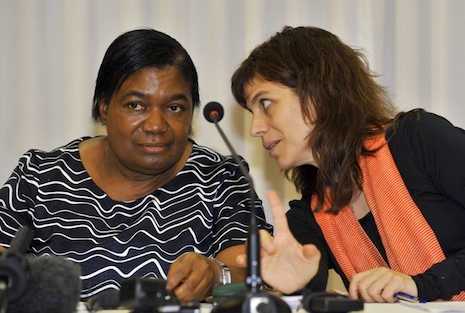
Margaret Sekaggya, left, speaks to OHCHR officer Dolores Infante Canibano during a press conference in Seoul on Friday (AFP photo/Jung Yeon-Je)
UN rights envoy Margaret Sekaggya said on Friday that South Korea’s human rights record was slipping as the national rights body has become less effective and a security law continues to erode freedom of speech in the country.
In the first visit by a UN rights envoy to the country, Sekaggya raised the National Security Law - a measure dating back to 1948 to protect the South from the Communist North - as a key rights challenge.
“I have been acquainted with the national security act which, despite the fact that it has been amended on several occasions, still appears seriously problematic for the exercise of freedom of expression,” she told reporters at a press conference in Seoul at the end of her landmark 10-day visit.
The law prohibits any material deemed “anti-state.”
In November, photographer Park Jung-geun received a 10 month suspended prison term for reposting and retweeting propaganda messages by the North he said he had altered to “ridicule the enemy,” in a case which sparked outrage among South Korean rights groups.
Sekaggya said that the former administration of Lee Myung-bak had eroded the effectiveness of the National Human Rights Commission of Korea (NHRCK) during five years in office up to the end of February.
“[The NHRCK] is no longer seen as a key player in the promotion and protection of human rights in the country, losing the confidence of many national stakeholders including rights defenders,” she said.
The national rights body needed to work independently of the government “to regain the confidence of human rights defenders,” she added.
An official of the NHRCK who requested anonymity agreed greater separation from the government was required but that there was rising recognition for its rights work in South Korea.
Lee Jin-ro, a professor of journalism at Youngsan University in Seoul, said that “freedom of expression went backwards” during the past five years under Lee.
“The actions of the new government of President Park Geun-hye to protect human rights and freedom of speech have not materialized yet,” he said.


